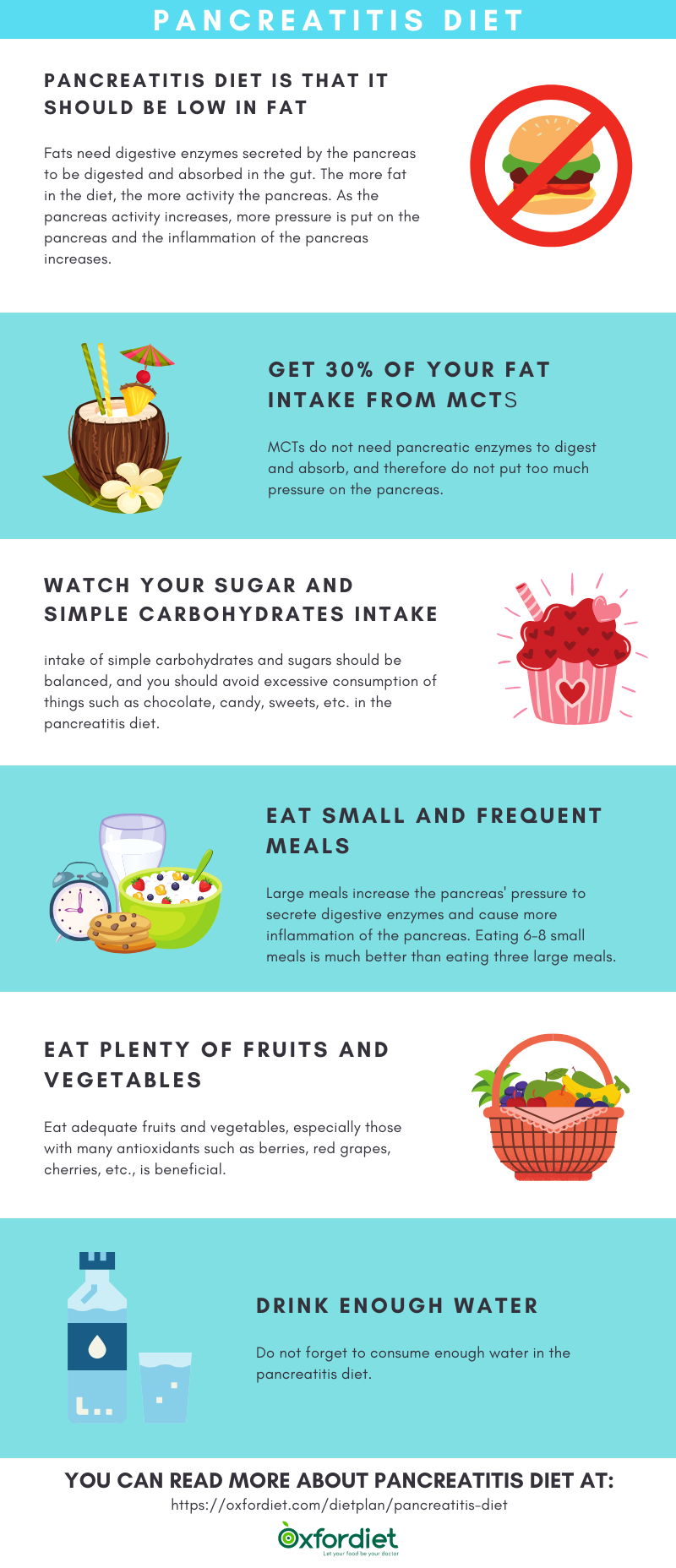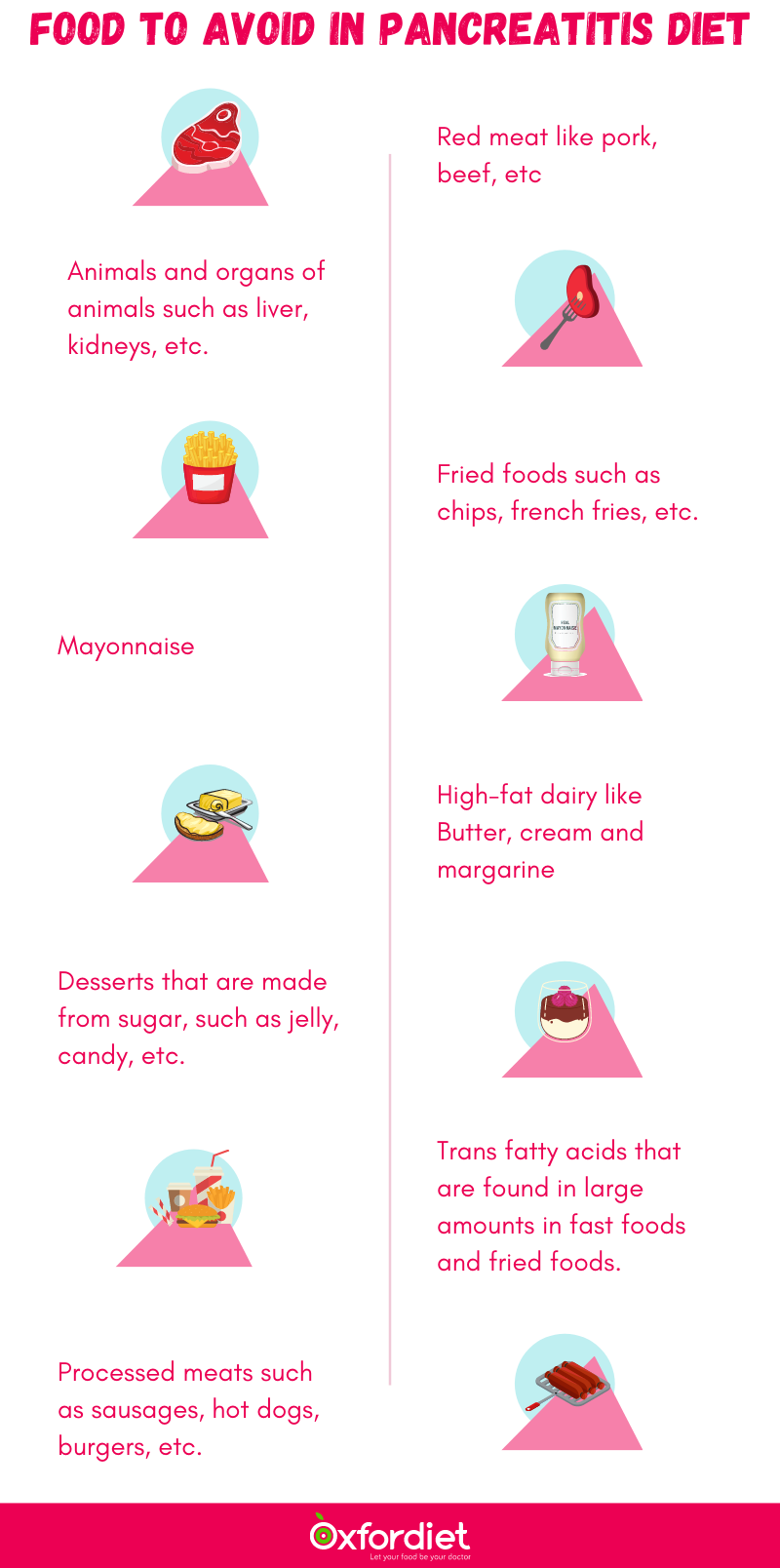A pancreatitis diet is essential for pancreatitis patients and helps to prevent malnutrition. It is a necessity for reducing inflammation, complications, and the risk of death in acute pancreatitis. Here, we help you to get a better understanding of the disease and how to improve it through a pancreatitis diet.
Pancreatitis is a disease in which the pancreas becomes inflamed. The pancreas is a small gland located behind the stomach and next to the intestines.
The pancreas has two important functions. The pancreas' first function is to secrete digestive enzymes that secrete these enzymes into the small intestine. And its second function is to produce and secrete two hormones, insulin and glucagon, which play a vital role in regulating the body's blood glucose.
Suppose digestive enzymes are activated inside the pancreas before they are secreted into the small intestine. In that case, they can damage the pancreas and cause pancreatitis.
Gallstones, alcohol consumption, abdominal surgeries, certain medications, gallbladder damage, and other injuries that block the pancreatic duct can cause pancreatitis.
There are two types of pancreatitis, acute pancreatitis and chronic pancreatitis; Acute pancreatitis and Chronic pancreatitis:
The pancreatitis diet is one of the important parts of the treatment of this disease. Without a proper diet, it is not possible to completely cure these patients. It is why we prepared this simple guide for the pancreatitis diet, which could be helpful.
After examination and prescribing medication, the doctor refers these patients to a dietitian for a pancreatitis diet.
Our goal of medical nutrition therapy in pancreatitis patients is to achieve the below objects:
♦ Prevent malnutrition and ensure adequate nutrition in the pancreatitis diet
♦ Maintaining normal blood glucose levels (prevention of hyperglycemia and hypoglycemia)
♦ Prevention of diabetes and kidney disease as well as other diseases caused by pancreatitis
♦ Prevent recurrence of pancreatitis and inflammation of the pancreas
To achieve these goals, that is necessary to make changes in the pancreatitis diet compared to the normal diet to relieve pressure on the pancreas.
The first thing about a pancreatitis diet is that it should be low in fat. Fats need digestive enzymes secreted by the pancreas to be digested and absorbed in the gut. The more fat in the diet, the more activity the pancreas must make to produce digestive enzymes. As the pancreas activity increases, more pressure is put on the pancreas and the inflammation of the pancreas increases.
Studies show that patients with pancreatitis can get up to 30% of their fat intake from MCTs; MCTs do not need pancreatic enzymes to digest and absorb, and therefore do not put too much pressure on the pancreas. Coconut and coconut oil are rich in MCTs. However, note that consuming too many MCTs can cause problems for the body and should not be overused in the pancreatitis diet.
Sugar and simple carbohydrates are other things to look out for in a pancreatitis diet. Because the pancreas produces insulins and glucagon, the two primary hormones that regulate blood sugar, pancreatitis can affect these hormones' secretion and upset blood sugar levels.
For this reason, the intake of simple carbohydrates and sugars should be balanced, and you should avoid excessive consumption of things such as chocolate, candy, sweets, etc. in the pancreatitis diet.
Meals in the pancreatitis diet should be small and frequent. Large meals increase the pancreas' pressure to secrete digestive enzymes and cause more inflammation of the pancreas. Eating 6-8 small meals is much better than eating three large meals and reducing the pancreas' pressure.
Adequate eat of fruits and vegetables, especially those with many antioxidants such as berries, red grapes, cherries, etc. is beneficial for you.
Avoid excessive consumption of fruits, vegetables, and high-fiber foods in one meal; these foods, due to their high fiber, reduce foods' absorption and harm digestive enzymes' effectiveness, so you should avoid eating high amounts of them.
Do not forget to drink plenty of water in the pancreatitis diet.

The amount of fat you can consume in the pancreatitis diet depends on your physical condition such as height and weight, and other physical conditions. Yet, in general, it can be said that the amount of fat in the diet of these patients should be about 60 grams per day. Of course, the amount of fat in each meal should not be more than about 10 grams to put extreme pressure on the pancreas.
To reduce the amount of fat in your pancreatitis diet, use lean meats such as chicken and fish, eat less red meat and cut off any visible fats and skin before cooking meats. Put the broth and soup in the refrigerator and after a while, remove the fat that is on top of it and then use it. Avoid fried and deep-fried foods, and if you need oil to cook food, spray a small amount on it. In the pancreatitis diet, it is better to eat boiled or steamed foods; sometimes, grilling meat can be a good choice.
Replace high-fat dairy products like cream and high-fat milk with low-fat dairy to reduce the total amount of fat in your diet. Finally, use more vegetable oils such as olive oil instead of animal fats such as butter.
As mentioned in the pancreatitis diet, some foods should be restricted in these patients' diets due to the lack of secretion of digestive enzymes. Below is a list of foods that should be limited or should not be consumed:
♦ Red meat like pork, beef, etc.
♦ Organs of animals such as liver, kidneys, etc.
♦ Fried foods such as chips, French fries, etc.
♦ Mayonnaise
♦ Butter, cream and margarine
♦ High-fat dairy
♦ Desserts that are made from sugar, such as jelly, candy, etc.
♦ Trans fatty acids that are found in large amounts in fast foods and fried foods.
♦ Processed meats such as sausages, hot dogs, burgers, etc.
Try to eat healthier foods in your pancreatitis diet instead of the foods listed above.

Adequate intake of vitamins and minerals in the pancreatitis diet is essential. In these patients, due to the malabsorption of vitamins and minerals and the increase in the body's metabolic activity, the need for vitamins and minerals increases, so their food sources should be consumed in a high amount in the pancreatitis diet.
In addition to the above, malabsorption of vitamins and minerals can occur due to alcohol consumption or fear of eating food due to abdominal pain and, eventually malnutrition.
Vitamin and Mineral deficiencies can cause many problems and diseases such as osteoporosis, anemia, gastrointestinal disease and other conditions caused by a lack of nutrients.
Therefore, patients with chronic pancreatitis must be evaluated for adequate vitamins and minerals intake and should be performed periodic tests to check their bodies' levels of vitamins and minerals. But in general, you can use multivitamins, calcium, iron, folate, vitamin E, vitamin A, vitamin D, and vitamin B12 based on DRI with a pancreatitis diet.
The points are made about a patient who is not malnourished. In patients with pancreatitis who are malnourished, their diet must be adjusted under a dietitian's supervision.
Alcohol is known as one of the main causes of acute and chronic pancreatitis. If you have acute pancreatitis and continue to drink alcohol, you will acquire chronic pancreatitis over time.
The risk of exacerbating pancreatitis increases with alcohol consumption, so if you have either chronic or acute pancreatitis, you should stop drinking alcohol.
If I want to tell you the 10 main home remedies for pancreatitis, I suggest you do the below.
1. Improve your diet and lifestyle; you can consult with a dietitian to improve it.
2. Take care of nutritional deficiencies.
3. Take vitamins A, D, E, K, and C supplements.
4. Eat more omega-3 fatty acids, such as fatty fish liver.
5. Add a probiotic supplement to your diet, or eat probiotic foods like yogurt, cheese, etc.
6. Drink green tea.
7. Add a Rhodiola supplement to your pancreatitis diet.
8. Try a Reishi mushroom supplement.
9. Use grape seed extract in your diet plan.
10. Eat more foods that are high in glutamine in your diet.
Why are fatty foods harmful to pancreatitis?
Hi Sarah,
The pancreas processes most of the fat you eat. So, the more fat you eat, the harder your pancreas works.
High-fat foods like fast foods or fried foods and simple sugars also increase your TG levels. Increase TG increases your risk for pancreatitis. Research shows that processed meat and red meat increase the risk of pancreatic cancer.
Are there vitamins or supplements I should take in the pancreatitis diet?
Chronic pancreatitis patients are at risk for nutrients malabsorption, so they should be tested regularly for nutritional deficiencies. Vitamin therapies should be based on annual tests. In general, besides a good pancreatitis diet, multivitamins, iron, folate, calcium, vitamin A, vitamin D, vitamin E, and vitamin B12 may be supplemented, depending on blood test results.
Hello. Why sometimes I can eat certain foods without any problem and other times those same foods cause problems?
Hi Frank,
Although it is not well known, many people encounter this phenomenon, and there is no clear answer. It's important to remember to take pancreatic enzymatic supplements regularly to ensure a lack of enzymes is not the cause.
Hello. Am I allowed to drink alcohol in my pancreatitis diet after I have been diagnosed with pancreatitis?
Hi Smith,
If pancreatitis was caused by excess alcohol consumption, you should avoid alcohol in your pancreatitis diet. If other causes of acute pancreatitis -like gallbladder stone- have been resolved, you can drink alcohol in moderation (maximum of 1 serving/day). However, if you have chronic pancreatitis, regular use of alcohol is unwise.